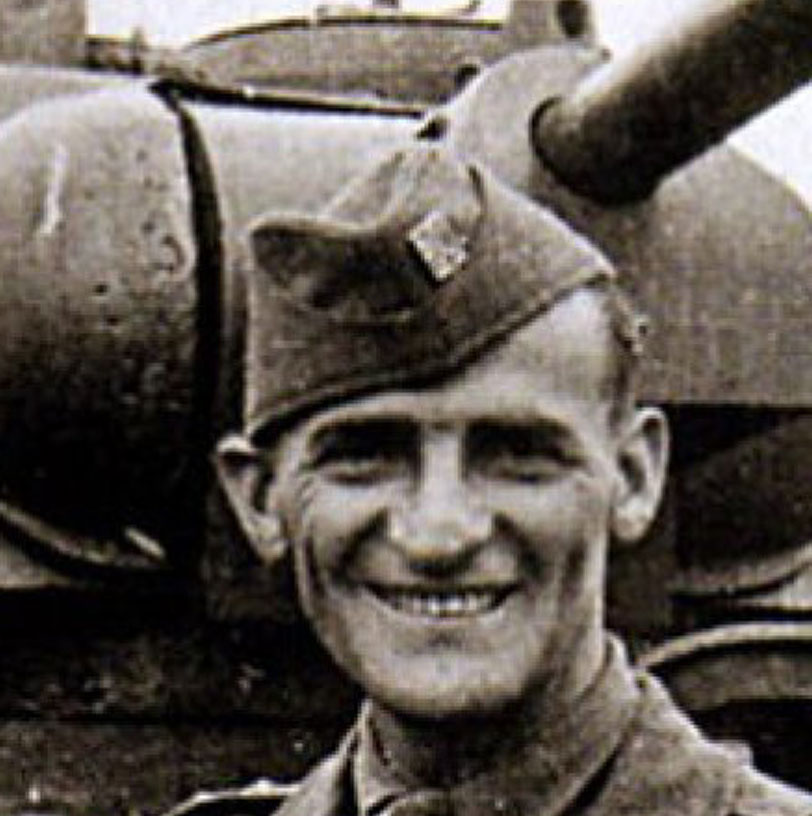
Postřekov bears the rare honor of having had nine citizens in the resistance during the war.
They are: Josef Kapic, Josef Buršík, Jiří Knopf, Josef Knopf, Vavřinec Strecker, Štěpán Holl, Pavel Tauber, Karel Kreuz, and Jakub Kreuz. Names that this town’s citizens will never forget.
Josef Buršík was even decorated as a Hero of the Soviet Union during the war. But in 1949, he was sentenced and jailed based on false treason charges. His friends helped him escape to Great Britain. In 1990, his name was cleared, and he was given the rank of Major General. He died in Northampton, England on June 30, 2002, and it was only posthumously that he received the Order of the White Lion—the Czech Republic’s highest state recognition. In 2003, the citizens of Postřekov unveiled a memorial plaque in his honor.
Those who remained in Postřekov were still no strangers to the horrors of war. On September 9, 1944, the schoolteacher Jan Čáp was shot and killed. Mr. Čáp, from the fairly distant town of Soběslav, had asked for a position in these ethnically German borderlands, but he was unpopular here for his purely Czech heritage. The local officials—Germans—monitored him and juggled him among positions. Once the Reich occupied Postřekov, he was dismissed due to his Czech nationalist ideas, and was to be transferred yet again.
Because he stated his approval of the assassination attempt on Hitler and was in touch with prisoners of war, he was reported and arrested. A German policeman led him in chains to the nearby town of Klenčí, where he then tried to escape but was shot in the head. He died at the hospital in Domažlice. Postřekov suffered yet another shock in the war’s final days. On May 2, after liberation by the US Army, the men of Postřekov set up a security duty. It searched the surrounding German villages seeking weapons.
On May 4, this force set off to Pařezov, where it confiscated several rifles from local civilians. As they were on their way back, a German SS army unit began to fire on the patrol from the forest atop Červený Vrch. The Germans captured two of its members, Josef Řezníček and Jiří Kohout, and tortured them at the school building in Otov.
The next day, they were executed around 6 a.m. at the local sand quarry. Jakub Krutina, Václav Gibfried, Josef Beroušek, and Václav Pacík were killed the evening before, when they tried to break the group free. These events were then followed by the American forces’ attack and the withdrawal of the Germans.
Eva Erbenová will definitely never be forgotten by Postřekov and its citizens. This Jewish girl was 15 at the end of the war and arrived here in the course of a death march from the Auschwitz concentration camp. Her life was saved by the fact that she fainted and was found in time by locals, who hid her and took care of her. She spent the end of the war with the Jahn family, whom she remembers to this day as if they were her own. Eva Erbenová moved to Israel after the war. But she never forgot Postřekov, and in the end she became an honorary citizen. She received this honorary citizenship in 2001 for promoting Postřekov in the movie O zlém snu (“About the Bad Dream”), which tells the story of her rescue.
Josef Buršík (September 11, 1911 – June 30, 2002) was a Czech resistance fighter, general, dissident, and political prisoner. In World War II, he fought as a member of the 1st Czechoslovak Independent Field Battalion, later reorganized into the 1st Czechoslovak Independent Brigade. He was decorated with the Gold Star Medal of the Hero of the Soviet Union.
After the war, Buršík was followed by the Communist authorities in Czechoslovakia. He was imprisoned and stripped of all his war honors except the Hero of the Soviet Union. He managed to escape and fight his way out to the West. He lived first in West Germany and then in the United Kingdom. He was active in aid organizations for Czech and Slovak refugees. In the 1950s, he released his memoirs, “No Pity for Sacrifice.” After the Soviet invasion of Czechoslovakia in 1968, Buršík returned his Hero of the Soviet Union medal in protest.
Despite lasting health problems, he lived in Czechoslovakia in his later years, up to the fall of Communism, and he was also officially “rehabilitated” and promoted to the rank of Major General in the Army of the Czech Republic. He also received the Order of the White Lion and the Milan Rastislav Štefánik Order.
He passed away in Northampton, England, in 2002 and was buried with full state honors. His grandson of the same name is a professional soccer player on two teams, Stoke City and England U21.